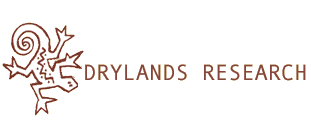Current activities
| Drylands policy development. Drylands Research has been at the cutting edge of international debates aiming to re-specify drylands development policy in terms of people-centred approaches. These approaches confront the necessity for enabling investment (both private and public) in drylands as a condition for their sustainable management. They build on the achievements of small and resource-poor households in conditions of climatic risk. They argue a fresh case for prioritizing the development of drylands where many of the world's poor people live. This work culminated in 2009 with a Drylands Challenge Paper published by IUCN, IIED and UNDP and written by Michael Mortimore with nine collaborators (see reference below), and launched at a Side-Event of the UNCCD's 9th Conference of the Parties, Buenos Aires. 85 pp Documents: Anderson, J., with 18 co-authors, 'Chance, change and choice in Africa's drylands. A new perspective on policy priorities?' CIFOR, Bogor, Indonesia, 2003 Global Mechanism of the UN Convention to Combat Desertification, 'Why invest in drylands?' Global Mechanism of the UN Convention to Combat Desertification, Rome (2005). See Published Articles page. UNDP, 'The Global Drylands Imperative: Achieving the Millennium Development Goals in the drylands of the world', Drylands Development Centre, Nairobi (2005) IUCN, IIED, UNDP, 'Dryland Opportunities: a new paradigm for people, ecosystems and development' (2009). Available from www.iucn.org Contact: Michael Mortimore (see About us). Integrated Ecosystem Management. The UN Convention on Biodiversity has adopted the principles of the 'ecosystem approach' which aims to reconcile the interests of humans with those of a sustainable nature. The approach links agro-ecosystems with the management institutions at local level and proceeds via stakeholder analysis towards strengthening local capacity. In order to test the method, case studies have been commissioned in a variety of agro-ecological zones. The Drylands Case Study is being carried out by Drylands Research in the transboundary zone between Nigeria and Niger, and its findings will inform the GEF-UNEP project on 'Integrated ecosystem management in shared areas between Niger and Nigeria' which is expected to commence in 2006. Contacts: B.Yamba, J.A.Ariyo, M.Mortimore (see About us). Additional contacts: Ibrahim Bouzou (e-mail: ) and Salisu Mohammed (e-mail: ). Situation Analysis of semi-arid ecosystems in sub-Saharan Africa. As members of a Consortium with Rhodes University, South Africa, Khanya (NGO), University of Nairobi, Excellent Development (NGO), Abdou Moumouni University, Niamey, CRAC-GRN (NGO), Ahmadu Bello University, Bayero University, Senegalese institutions, the World Conservation Union (IUCN) and the International Institute for Environment and Development, Drylands Research associates participated in a strategic assessment of ecosystem management and poverty relations on behalf of the Natural Environment Research Council, Economic and Social Research Council and Department for International Development of the UK. The study reported in March, 2008. |
